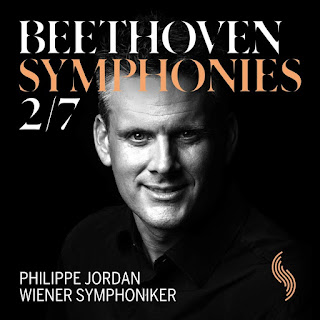Beethoven Symphonies Nos. 2 & 7; Wiener Symphoniker, Philippe Jordan; Wiener Symphoniker Reviewed by Robert Hugill on 30 October 2018 Star rating: (★★★★)
Full of life and energy, two symphonies which brush away any cynicism with sheer joie de vivre
I have come rather late to this series, Philippe Jordan and the Wiener Symphoniker have already issued discs of Beethoven's symphonies nos. 1 & 3, and nos. 4 & 5 on the orchestra's own label. This disc couples together performances of Symphony No. 2 in D minor Op. 36 and Symphony No. 7 in A major Op. 92.
Full of life and energy, two symphonies which brush away any cynicism with sheer joie de vivre
I have come rather late to this series, Philippe Jordan and the Wiener Symphoniker have already issued discs of Beethoven's symphonies nos. 1 & 3, and nos. 4 & 5 on the orchestra's own label. This disc couples together performances of Symphony No. 2 in D minor Op. 36 and Symphony No. 7 in A major Op. 92.
Founded in 1900, and with its first concert taking place in the Vienna Musikverein (where this disc was recorded), from the outset the orchestra was at the centre of Viennese symphonic musical life. But with a Swiss music director, Philippe Jordan, who is also music director of the Paris Opera, clearly Jordan and the orchestra might take an interesting contemporary view of this tradition and what it means.
In this series of Beethoven symphonies, Jordan is pairing the lesser known and well known, and here we start with Symphony No.2, which premiered in 1803 (when Beethoven was 33). One might be forgiven a bit of cynicism when presented with yet another Beethoven cycle. But Jordan and the orchestra brush that away with the wonderful engagement and joie de vivre of their playing.
The slow introduction of no. 2 opens with some finely elegant wind playing, and we come to appreciate the orchestra's lithe and vital sound, with nods to Historically Informed Performance but without losing the essential vitality and depth of history that such an orchestra playing on traditional instruments brings.
The first movement proper is engaging and engaged, with clean lines and crisp rhythms. The slow movement combines elegance with insouciance, whilst the scherzo has a Haydn-esque joy, yet not without incisive dramatic moments. Finally the vivid skittering of the last movement, fast but like all of Jordan's speeds on this disc, never seeming too rushed. Beethoven's debt to Haydn comes out in this performance, but Jordan isn't just wit and detail, he makes the movements flow architecturally too.
This latter point counts for a lot in no. 7, with its infamous metronome speeds. Jordan and his orchestra keep things moving, making the speeds seem fast and obvious, rarely too much and never seeming to be slowed down to make the music viable, either.
The introduction of no. 7 is elegant, though perhaps lacking the element of constant anticipation which should lead us to the vivacious opening movement. And vivacious it is, delightfully pointed and, pace Wagner, this dance is positively toe-tapping. There is a nice sense of flow in the slow movement, with the rhythmic shape almost making it a slow dance. Then the Presto positively explodes on the scene with lovely harmonie musik in the trio. The finally is a brilliant summation of all this, at times Jordan seems to drive the movement fast except that music seems to fall over itself in anticipation, and then the pace eases slightly to allow things to breathe before the next. And throughout, that feeling of infectious energy.
You sense the engagement and vitality of these performances, the players seem to be wanting to be playing this music and keen to convey their enthusiasm to you. By my reckoning we have nos. 6 & 8, and no. 9 to come. Definitely something to look forward to.
Ludwig van Beethoven (1770-1827) - Symphony NO. 2 in D major op.36
Ludwig van Beethoven- Symphony No. 7 in A major op.92
Wiener Symphoniker
Philippe Jordan
Recorded, Goldener Saal, Musikverein, Wien, 21/23 April 2017
WS015 1CD [72.01]
Available from Amazon.
Elsewhere on this blog:
- The Unknown Traveller: The Fieri Consort in Italian madrigals from Musica Transalpina and Ben Rowarth (★★★★) - CD review
- Disturbing intensity: Lucia di Lammermoor at ENO (★★★★) - opera review
- Voices of Aotearoa - Voices New Zealand Chamber Choir at Cadogan Hall (★★★½) - concert review
- Die Walküre - Royal Opera House Live - (★★★½) Opera review
- Confidence: Julien Behr in 19th century Romantic French opera arias (★★★★★) - CD review
- Musical drama: Bellini's Norma with Helena Dix in the title role - (★★★★½) - Opera review
- New music in Manchester - I chat to Tim Williams, artistic director of Psappha - my interview
- A walk with Ivor Gurney: Sarah Connolly and Tenebrae at Wigmore Hall (★★★★) - concert review
- Colour and movement: orchestral music by Kenneth Hesketh (★★★½) - CD review
- Abbandonata: Italian cantatas from Carolyn Sampson and Robert King (★★★★) - CD review
- Vivid story telling: Schubert's Swansong with Sir John Tomlinson and Christopher Glynn (★★★★) - CD review;
- Music for Windy Instruments: Sounds from the court of King James I (★★★½) - CD review
- Independent Opera Showcase Recital at Wigmore Hall (★★★½) - concert review
- Damn fine music: Stanford's Mass Via Victrix (1914-1918) receives its belated premiere - feature
- Home












No comments:
Post a Comment